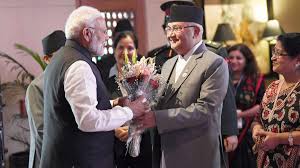World
Nepal PM flays Indian statement in Geneva

Kathmandu: Nepal Prime Minister K.P. Sharma Oli on Friday criticized India for raking up human rights abuses in the Himalayan nation at a UN Human Rights Council meet in Geneva.
India, for the first time, raised the issue of war crimes committed during the decade-long conflict in any international forum and urged Nepal to carry out the transitional justice mechanisms in an effective way.
Speaking to the media, Oli demanded to know how India could be ignorant that the the UN was involved in Nepal’s peace process.
He said India had not made its position public earlier on Nepal’s transitional justice mechanisms or their efficacy but raised the issue at an international body.
The Indian representative said in Geneva that Nepal should “ensure the effective functioning of the Truth and Reconciliation Commission and full implementation of its recommendations, including prosecution of those responsible for violent insurgency”.
This has been widely interpreted here as another example of India’s harsh stand vis-a-vis Nepal.
Without taking any name, Oli said: “Some days back, one of the leaders from our neighbourhood publicly warned that India will show its mettle against Nepal.
“Now, they are digging out a decade-old-issue,” he added.
The prime minister said Nepal had formed the Truth and Reconciliation Commission and another commission to probe the disappeared people to address war crime issues such as killings, torture and rape.
“We faced war in the past. Then we realized it was not possible to have war all the time. So we initiated the peace process,” said Oli, adding Kathmandu also invited the UN to resolve the armed conflict.
“The conflicting parties in the past are together today and carrying out democratic and peaceful reforms, whether they are in the government or not,” he said.
World
Lockdowns in China Force Urban Communities to Defy Censorship and Vent Frustration Online

Shanghai’s rich middle class is leading a wave of online dissent over the strict and prolonged lockdowns imposed in various parts of the country. Chinese internet censorship is struggling as patience is wearing thin in many urban centers, coming up with creative forms of online protests.
Social Media Posts Revealing Lockdown Tension in Shanghai
Drawn-out lockdowns are nothing new in China as authorities insist with the nation’s zero-Covid policy since the start of the pandemic. Currently over This time around, however, metropolitan areas like Shanghai are increasingly difficult to keep quiet, given that its more than 25 million residents have seen weeks of total isolation along with food shortages and many other service interruptions.
Dozens of towns and reportedly over 300 million Chinese citizens have been affected by lockdowns of different severity. As expected, urban netizens have been most outspoken over their difficulties by finding creative ways to get around state censorship and bans placed on topics, news comments and spontaneous campaigns.
Shanghai residents have been using mobile proxies and hijacking seemingly unrelated hashtags to talk about healthcare issues, delivery failures and the overall severity of their situation. The “positive energy” that the Chinese government wants to transmit during the recent prolonged series of lockdowns does not come naturally to those counting food supplies and online censors are working hard to filter words, trending topics and undesired social media sharing.
WeChat groups and message threads are under constant monitoring. Posts questioning the zero-Covid approach have been quickly deleted, including by leading Chinese health experts like Dr. Zhong Nanshan. Video footage is soon censored and protests and investigations are quickly made to disappear.
Where this has not worked, officials have exposed banners with warnings and outright threats like “watch your own mouth or face punishment”, while drones have been patrolling the city skies. Yet, if anything, this has led to further tensions and unspoken confrontation with Shanghai’s educated and affluent middle class.
Creative Online Solutions Harnessing Civic Energy
Announcements by Chinese social media that they would be publishing the IP addresses of users who “spread rumors” have not helped either. Tech industry research has shown that much of Asia’s tech-savvy population has a habit of using mobile proxies and other privacy tools, quickly finding workarounds to browse the internet freely and talk to the world about the hottest topics.
The sheer volume of forbidden posts is already a challenge for the very censorship system, experts explain. Unable to track all trending hashtags, state workers overlook topics that speak about the US, Ukraine or other popular news. Linking human rights elsewhere to their situation, Chinese online dissidents establish their informal channels and “hijack” the conversation to share personal or publicly relevant information about the Covid suppression in their town.
Sarcastic and satirical posts still dominate. Others hope to evade the censors by replacing words from famous poems or the national anthem. One thing is certain – social media, when harnessed with the right creativity, has proven its ability to mount pressure on the government in even some of the most strictly controlled tech environments like China.















